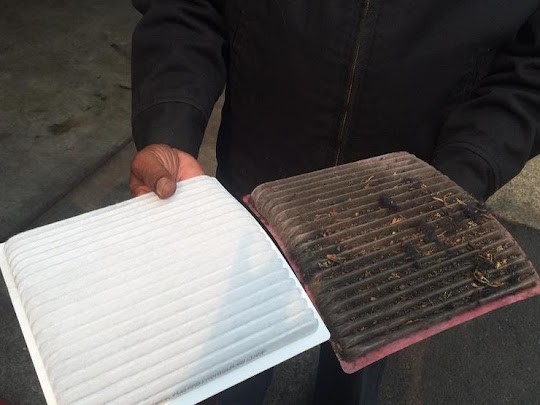Car air filters can reduce some smoke particles but are not designed to filter smoke completely. These filters primarily capture dust and pollen.
Maintaining clean air inside your vehicle is essential for a comfortable driving experience. Car air filters play a crucial role in purifying the air that enters the cabin. While their primary function is to trap larger particles like dust, debris, and pollen, they also partially capture smoke particles.
However, their efficiency in smoke filtration varies depending on the type and size of the filter. A standard air filter might not be as effective against smoke because it is designed for larger contaminants.
For drivers concerned about smoke, especially those who frequently drive in areas prone to wildfires or heavy pollution, upgrading to a more advanced filter like a HEPA or an activated carbon filter might be worth considering. These enhanced filters offer a higher degree of protection against finer particles found in smoke.
Regularly checking and replacing your car’s air filter will ensure better air quality and potentially improve your vehicle’s HVAC system performance.
Function Of Car Air Filters
The primary function of car air filters is to purify the air entering the vehicle’s engine and cabin. These filters trap various contaminants, particulates, and pollutants, ensuring only clean air flows through. Car air filters are instrumental in maintaining engine efficiency and longevity by preventing abrasive particles from causing wear.
Car air filters also work to improve the air quality inside the vehicle. By filtering out smoke, dust, pollen, and other fine particulates, they contribute to a healthier, more pleasant driving environment. This is especially beneficial for individuals with allergies or respiratory issues who are more sensitive to these airborne irritants.
Cabin air filters specifically play a crucial role in filtering the air that circulates within the car’s interior, whereas engine air filters protect the engine from the outside contaminants. The table below details the types of particles filtered by car air filters.
| Particle Type | Cabin Air Filter Role | Engine Air Filter Role |
|---|---|---|
| Dust and Pollen | Yes | Yes |
| Smoke Particulates | Yes | Minimal |
| Exhaust Fumes | Some | No |
| Mold Spores | Yes | Yes |
| Bacteria and Viruses | Some Filters | No |
Do Car Air Filters Filter Smoke
Car air filters are designed to trap dust, pollen, and other pollutants to ensure a clean air supply to the engine and the interior cabin. While they do a commendable job at filtering particulates, their efficiency in capturing smoke particles may vary significantly. This variation is due to the smoke’s composition, which can include a complex mixture of gases and fine particles that are harder to capture.
The effectiveness of an air filter against smoke is determined by several factors: the filter’s material, the size of the filter pores, and the air flow rate through the filter. Generally, filters with smaller pores can capture more fine particles but may restrict airflow more than those with larger pores.
It’s crucial to recognize that standard air filters, such as the ones commonly found in vehicles, are not specifically engineered for smoke filtration. These filters can partially reduce the presence of smoke but are not likely to eliminate it entirely.
For enhanced protection, especially in areas prone to wildfires or heavy pollution, a specialized cabin air filter with activated carbon or other advanced media might be necessary.
Choosing The Right Air Filter
Choosing the right air filter for your car is crucial, especially if you’re concerned about the intrusion of smoke. The effectiveness of an air filter depends greatly on its material composition. High-Efficiency Particulate Air (HEPA) filters and those that incorporate activated carbon are particularly adept at trapping smoke particles.
Filtration media such as paper, foam, and cotton each have different efficacy levels. HEPA filters, known for their high standards, have a vast surface area capable of capturing particles as small as 0.3 microns. Activated carbon, on the other hand, is impregnated in some filters to absorb smoke and odors.
In contrast, aftermarket air filters frequently offer improved performance over standard factory-installed filters. These may feature a combination of various materials designed to enhance smoke filtration. It is advisable to scrutinize the specifications of these aftermarket options to ensure they meet your filtration needs.
Maintaining Air Quality In Your Vehicle
Ensuring your car’s air filters are in top condition is crucial for maintaining air quality within your vehicle. Regularly check and replace your air filters to prevent smoke and particulate matter from entering the cabin. A clean air filter can effectively trap smoke particles, providing you with cleaner air to breathe.
Consider installing a cabin air filter specifically designed to reduce smoke infiltration if your vehicle isn’t already equipped with one. Keeping windows closed and utilizing the recirculate air function while driving in smoky conditions can also substantially reduce the amount of smoke entering your car.
| Method | Description | Frequency |
|---|---|---|
| Check Air Filter | Examine filter for debris and clogs | Every 15,000 to 30,000 miles |
| Replace Air Filter | Install new filter to ensure efficiency | As per manufacturer’s recommendation |
| Seal Windows | Maintain windows closed to block smoke | During smoky conditions |
- Employ the vehicle’s internal recirculation feature to keep external smoke from entering the system.
- Driving at reduced speeds can lessen the amount of smoke drawn into the car’s ventilation system.
- Seek routes with better air quality and fewer smoke risks, using real-time air quality tracking apps.

Credit: paulsautomotiverepair.com
Conclusion
To sum up, car air filters can offer a degree of protection against smoke, enhancing the driving experience. Yet, they’re not foolproof. Regular checks and replacements ensure optimal air quality. For comprehensive smoke filtration, specialized filters are your best bet.
Drive safe, breathe cleaner.
